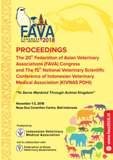PCS-11 Mesenchymal Stem Cell-Conditioned Medium Improve the Recovery of Pancreatic α and β Cells in Type 1 Diabetes Mellitus
Abstract
Mesenchymal stem-cell is a pluripotent cells that can be differentiated into many kinds of cells (1) and have abilities to differentiated into mature cell, secreted cytokines, and releasing many kinds of protein functioned in body body regulation (2). However, the therapeutic effect of stem cell arise from their secreted factor such as growth factors, cytokines, chemokines, and metabolits which acts as biologic regulator in the autocrine and paracrine body function (3). Secreted factors of mesenchymal stem cells known as secretome or mesenchimal stem cell conditioned medium (MSC-CM) have therapeutic effect for antiapoptosis, angiogenic, immunomodulatoric, and chemoattraactive activity (4). Mesenchymal stem cell conditioned medium used as the replacement agent for cell therapy because it contains no cells and save for used in different individual (5).
Type 1 diabetes mellitus (DMT1) is a disorder characterized by destruction of the insulin-producing pancreatic β-cell that progressively leads to insulin deficiency and resultant hyperglycemia. Insulin deficiency can lead to progressive metabolic derangement, with worsening hyperglycemia, ketoacidosis, starvation, and death (6). Glucagon is a hormone produced by pancreatic α cells. Glucagon releases by the pancreas to raise the concentration of glucose in the bloodstream when the concentration of glucose in the bloodstream too low (7). Glucagon worked in opposite with insulin, which lowers the extracellular glucose level, while insulin works to increase the extracellular glucose level (8).
The aim of this study was to investigate the role of MSC-CM on the structural and functional regeneration of pancreatic α and β cells in Wistar rat (Rattus norvegicus) induced with type 1 diabetes mellitus. The datas in this study will completes the information about the effect of MSC-CM on pancreatic cells regeneration, which has been presented in previous study (9).

